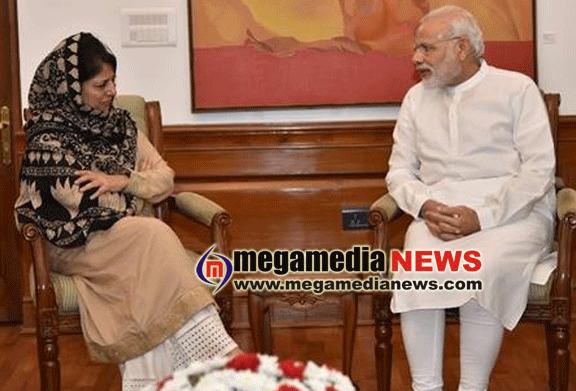Kashmir unrest: J&K CM Mehbooba Mufti meets Narendra Modi in Delhi
1:02 PM, Saturday, August 27th, 2016 New Delhi: Jammu and Kashmir Chief Minister Mehbooba Mufti on Saturday met Prime Minister Narendra Modi at his residence to discuss the situation in the Valley, which has been under curfew for past 48 days following death of Hizbul Mujahideen commander Burhan Wani.
New Delhi: Jammu and Kashmir Chief Minister Mehbooba Mufti on Saturday met Prime Minister Narendra Modi at his residence to discuss the situation in the Valley, which has been under curfew for past 48 days following death of Hizbul Mujahideen commander Burhan Wani.
The meeting comes close on the heels of a clear message from the Centre to the chief minister to control the growing unrest in the state.
According to official sources, Mehbooba has been conveyed in no uncertain terms that there was a need for putting an end to the cycle of violence which has claimed 67 lives so far in the protest.
This is the first meeting between the Prime Minister and Mehbooba after the unrest broke in the Valley on July 8. Mehbooba has been under fire for failing to control the violence as the Centre has made it clear that law and order was a state subject.
Earlier this week, Modi had a meeting with a delegation of Opposition parties from the state led by former Chief Minister Omar Abdullah.
After that meeting, for the first time, Modi had expressed his “deep concern and pain” over the situation in the Valley and asked all political parties to work together to find a “permanent and lasting” solution to problems in the state.
He had also made an appeal for restoration of normalcy in the Valley and emphasised that there has to be a dialogue.
In his statement, the Prime Minister had appreciated the “constructive suggestions” made by the Opposition delegation during the talks and reiterated his government’s commitment to the welfare of people.
Mehbooba had strongly defended security forces action on Friday during a press conference and had said “People came on streets, we imposed curfew. Did the children go to army camps to buy toffees (candy)? Was the 15-year-old boy, who attacked the police station at Damhal Hanjipora (in south Kashmir), going there to get milk…”
She had said “Today 95 per cent who have been killed are youngsters belonging to poor families. They were killed in retaliation for attacking security camps… The situations of 2010 and present cannot be compared.”
She claimed that 95 per cent of people want to resolve the Kashmir issue through political means and dialogue but five per cent people were resorting to agitation.
Simillar Posts
Warning: count(): Parameter must be an array or an object that implements Countable in /home/megamcaq/public_html/wp-content/plugins/post-plugin-library/common_functions.php on line 357
- None Found
Leave a Reply
© Copyright 2008 www.megamedianews.com All Rights Reserved. Privacy Policy








 Posted in
Posted in  Tags:
Tags: 



